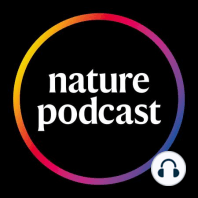4 min listen
An anti-CRISPR system that helps save viruses from destruction
FromNature Podcast
ratings:
Length:
30 minutes
Released:
Oct 18, 2023
Format:
Podcast episode
Description
In this episode:00:47 An RNA-based viral system that mimics bacterial immune defencesTo protect themselves against viral infection, bacteria often use CRISPR-Cas systems to identify and destroy an invading virus’s genetic material. But viruses aren’t helpless and can deploy countermeasures, known as anti-CRISPRs, to neutralise host defences. This week, a team describe a new kind of anti-CRISPR system, based on RNA, which protects viruses by mimicking part of the CRISPR-Cas system. The researchers hope that this discovery could have future biotechnology applications, including making CRISPR-Cas genome editing more precise.Research article: Camara-Wilpert et al.09:05 Research HighlightsCarved inscriptions suggest a queen named Thyra was the most powerful person in Viking-age Denmark, and the discovery of a puffed-up exoplanet that has just 1.5% the density of Earth.Research Highlight: Runes on Viking stones speak to an ancient queen’s powerResearch Highlight: ‘Super-puff’ planet is one of the fluffiest worlds ever found11:38 Modelling the future of Greenland’s ice sheet meltClimate-change induced melting of Greenland’s vast ice sheet would contribute to 7m of sea level rise. But it has been difficult to calculate how the ice sheet will respond to future warming. This week, a team suggest that abrupt ice loss is likely if the global mean temperature is between 1.7 °C and 2.3 °C above pre-industrial levels. Keeping temperature rise below 1.5 °C could mitigate ice loss, if done within a few centuries, but even a short overshoot of the estimated threshold could lead to several metres of sea-level rise.Research article: Bochow et al.17:50 Briefing ChatA massive reproducibility exercise reveals over 200 ecologists get wildly-diverging results from the same data, and how melting simulated lunar-dust with lasers could help pave the Moon.Nature News: Reproducibility trial: 246 biologists get different results from same data setsNature News: How to build Moon roads using focused beams of sunlightSubscribe to Nature Briefing, an unmissable daily round-up of science news, opinion and analysis free in your inbox every weekday. Hosted on Acast. See acast.com/privacy for more information.
Released:
Oct 18, 2023
Format:
Podcast episode
Titles in the series (100)
Nature Podcast Extra: Futures: Futures is Nature's weekly science fiction slot. Now its sister title Nature Physics has followed suit, publishing a sci-fi story each month. Kerri Smith reads you this month’s tale, The stuff we don’t do, by Marissa Lingen. by Nature Podcast
